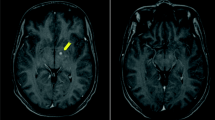Abstract
Cryptococcal meningitis is a rare entity among immunocompetent hosts but, when it occurs, it is associated with significant morbidity and mortality. Clinical presentation as well as the course of the disease is usually subtle and indolent with headache and altered mental status. The authors present the case of a 59-year-old man, who sought medical help with a 2-week history of headaches accompanied by nausea and visual and hearing disturbances. On admission the patient was afebrile, presented visual and hearing deficits and had a normal magnetic resonance image of the brain. A lumbar puncture was performed and microscopic examination of the cerebrospinal fluid revealed yeasts that were identified as Cryptococcus spp. and later, by means of molecular biology techniques, as Cryptococcus neoformans, var. grubii. The patient was treated with liposomal amphotericin B plus fluconazole for 28 weeks. At follow-up after 1 year the patient was asymptomatic and received fluconazole 400 mg/day as prophylactic therapy. The outcome of Cryptococcus infections in immunocompetent hosts is reported to be poor as a result of a delayed diagnosis and suboptimal initial antifungal therapy. The influence of the normal immune response is unclear.



Similar content being viewed by others
References
Chen S, Australasian Society for Infectious Diseases (AIDS) Mycoses Interest Group. Cryptococcosis in Australasia and the treatment of cryptococcal and other fungal infections with liposomal amphotericin B. J Antimicrob Chemother. 2002;49(suppl 1):57–61.
Ecevit I, Clancy C, Schmalfuss I. The poor prognosis of central nervous system cryptococcosis among nonimunossupressed patients: a call for better disease recognition and evaluation of adjuncts to antifungal therapy. Clin Infect Dis. 2006;42:1443–7.
Perfect JR, Dismukes WE, Dromer F, et al. Clinical practice guidelines for the management of cryptococcal disease: 2010 update by the infectious diseases society of America. Clin Infect Dis. 2010;2010(50):291–322.
King J, DeWitt M. Cryptococcosis. 2012. http://www.emedicine.com.
Satishchandra P, Mathew T, Gadre G, et al. Cryptococcal meningitis: clinical, diagnostic and therapeutic overviews. Neurol India. 2007;55:226–32.
Nau R, Sörgel F, Eiffert H. Penetration of drugs through the blood-cerebrospinal fluid/blood-brain barrier for treatment of central nervous system infections. Clin Microbiol Rev. 2010;23:858–83.
Disclosures
This manuscript has been published in a journal supplement that was created with an unrestricted educational grant from Gilead Portugal. The authors have no conflicts of interest to declare.
Author information
Authors and Affiliations
Corresponding author
Rights and permissions
About this article
Cite this article
Louro, R., Ferreira, R., Pinheiro, C. et al. Fungal Meningitis in an Immunocompetent Patient. Clin Drug Investig 33 (Suppl 1), 47–50 (2013). https://doi.org/10.1007/s40261-012-0021-5
Published:
Issue Date:
DOI: https://doi.org/10.1007/s40261-012-0021-5




